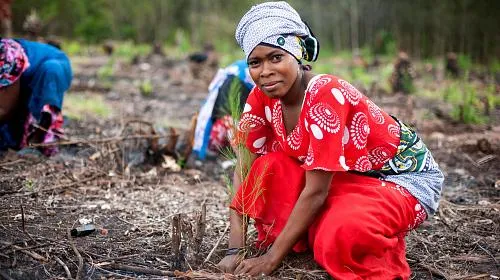Major new UN report shows how world’s poorest people are already bearing brunt of global climate disruption
Yokohama, Japan (March 31, 2014) Eradicating global poverty will become a near-impossible task unless governments take urgent action to tackle the growing injustice of climate change, says CARE, the global poverty-fighting organization, in response to a major new UN climate impacts report by the Intergovernmental Panel on Climate Change. (IPCC)
Sven Harmeling, CARE International’s Climate Change Advocacy Coordinator said:
“The IPCC’s latest report is a study in the sheer injustice of climate change. The world’s poorest people have done the least to cause the climate problem, yet today we have stark new scientific evidence that they are already, and will increasingly, bear the brunt of its impacts.
“But overcoming climate poverty is not a task of charity, it is an act of justice. Climate change is man-made and it can be contained by the actions of human beings. This task falls to the current generation of leaders, and to us all. There is not a moment to lose.”
The latest IPCC report, compiled by hundreds of the world’s leading climate experts on behalf of the UN, describes how climate change constitutes an additional burden for the rural and urban poor and has the potential to push people into chronic poverty, undermining and reversing development gains made over many years.
It also shows that, as global temperatures rise, there is increasing risk of passing critical ‘tipping points’, which may lead to abrupt and irreversible large-scale changes to major ecosystems on which millions of people rely.
Describing the IPCC’s latest report as “another clarion call to action,” CARE wants to see:
- Governments working harder than ever to keep global warming to as close to 1.5 C (2.7 F) as possible to avert extreme climate change.
- Developed countries providing far greater financial support to help poor countries address climate impacts, with actions focusing on helping the most vulnerable people and communities to build their resilience to increasing climate disruption, and greater support to help people deal with the loss and damage already occurring.
- Efforts to tackle climate change address the underlying causes of poverty and inequality. CARE works with women and girls, who are often among the most vulnerable and the most marginalized. Climate impacts are increasingly undermining their chances of lifting themselves from poverty.
- Enhanced support for thousands of existing climate initiatives around the globe, whether safeguarding the poor from increasing drought, promoting sustainable and renewable energies or divesting from fossil fuels.
Just a quick snapshot of CARE’s work in 84 countries reveals how people living in poverty are increasingly being affected by immediate (storms or floods) and longer-term shocks (unpredictable seasons and lack of rainfall which disrupt harvests).
Over recent months CARE has responded to a number of major emergencies including the devastating Typhoon Haiyan in the Philippines – the strongest tropical cyclone to make landfall in recorded history – and major flooding in Bolivia affecting some 59,000 families. CARE is also witnessing landslides in Papua New Guinea, flooding and heavy rains in Burundi, flooding in Zimbabwe and an escalating food crisis in both South Sudan and Mali.
Notes to Editors
1. To arrange an interview with Sven Harmeling, CARE International’s Climate Change Advocacy Coordinator, contact Jo Barrett, Climate Change Communications Coordinator jbarrett@careclimatechange.org or +44 (0)7940 703911
2. Communities CARE works with around the world are already experiencing the impacts of climate change first-hand. In Vietnam, Mozambique and Ecuador, unpredictable weather patterns and more intense storms and drought are particularly affecting people’s ability to grow food. Case studies are available here: http://www.careclimatechange.org/personal-stories. Please contact Jo Barrett jbarrett@careclimatechange.org for high-resolution photos.
3. CARE is working to address many of the risks facing poor and vulnerable people through groundbreaking initiatives including the climate change Adaptation Learning Program for Africa, initiatives to support highland communities in the Andes who are bearing the brunt of glacial retreat, and projects to restore mangroves and other coastal defenses in parts of Indonesia, Thailand and Vietnam (amongst many others). All of these programs are helping communities to address climate-related risks so that the impacts of climate change don’t tip people back into extreme poverty. At the same time, CARE is advocating for policies and laws at a national and global level that tackle the causes and effects of climate change whilst also promoting the rights and interests of the world’s poorest people.
4. CARE is a leading humanitarian organization fighting global poverty and providing life-saving assistance in emergencies. In 84 countries around the world, CARE places special focus on working alongside poor girls and women because, equipped with the proper resources, they have the power to lift whole families and entire communities out of poverty. See www.careclimatechange.org for further information.

